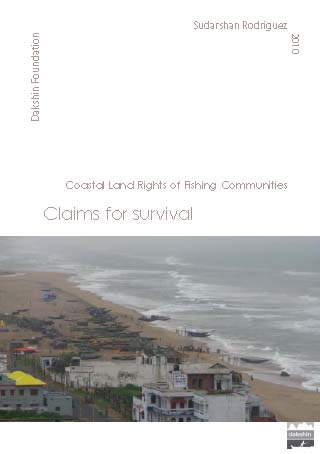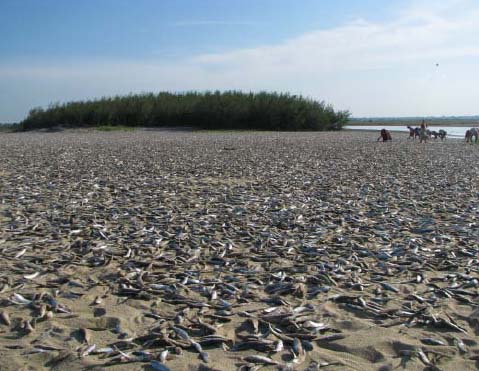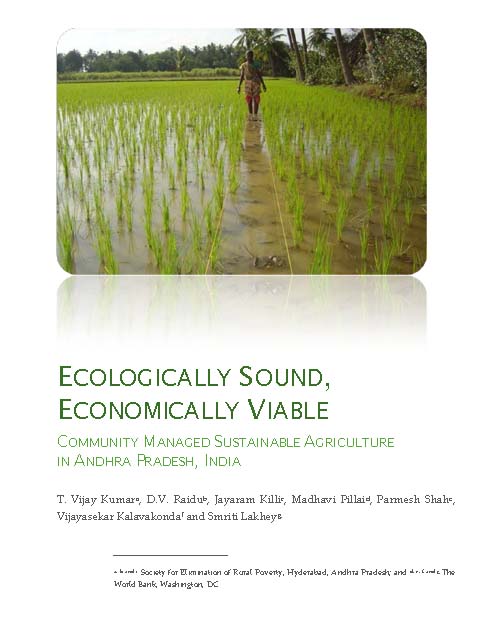Food and Nutrition
Claims for survival - Coastal land rights of fishing communities – A report by Dakshin Foundation
Posted on 22 May, 2011 09:25 AM Marine-coastal ecosystems and coastal communities are poorly represented in the public debates on India’s social and environmental problems. Coastal and marine ecosystems are the backbone of a fisheries economy that supports livelihoods of millions directly and several more indirectly.
Marine-coastal ecosystems and coastal communities are poorly represented in the public debates on India’s social and environmental problems. Coastal and marine ecosystems are the backbone of a fisheries economy that supports livelihoods of millions directly and several more indirectly.
Community groups such as fishers and other coastal populations enjoyed customary or traditional rights to exploit resources and to fish in adjacent coastal areas. The current state of fisheries finds its genesis in the modernization programme introduced by the Government of India to ‘develop’ the sector with the focus for development through the maximisation of production. In the late 1970s, modern fishing methods threatened the livelihoods of these communities and coastal ecosystems. Mechanised craft and gear, principally trawlers with bottom trawling gear, severely impacted fishing stocks.
Fisherfolk in India have struggled for greater control over the seas and resource management, struggles which have been directed both inward as well as against the State. The conflict over the coastal space is mostly between fishing communities and other new users and interest groups. Access to coastal resources is now being thrown open to all, giving a new meaning to the idea of ‘coastal commons’. There are very clear linkages between the rights to the coast and the right to fish as without the former, the latter will be difficult to operationalise and eventually rendered meaningless.
The Coastal Regulation Zone (CRZ) Notification, 1991 has been the only legislation with some mention and reference to customary rights of fishing communities on land in the coastal zone. However, it did not contain provisions and details to ascertain or establish these rights. Despite this, fishing communities have seen the CRZ in its 1991 form as an instrument in their favour as it regulates all activities that can potentially impact the coast and community livelihoods. However, the twenty one odd amendments to the CRZ Notification were mostly in favour of development pressures and special interest lobbies.
some mention and reference to customary rights of fishing communities on land in the coastal zone. However, it did not contain provisions and details to ascertain or establish these rights. Despite this, fishing communities have seen the CRZ in its 1991 form as an instrument in their favour as it regulates all activities that can potentially impact the coast and community livelihoods. However, the twenty one odd amendments to the CRZ Notification were mostly in favour of development pressures and special interest lobbies.
This backdrop forms the driving force behind this report which seeks to argue a case for according coastal land rights to fishing communities.
Ecologically sound, economically viable community managed sustainable agriculture in Andhra Pradesh – A report by Society for Elimination of Rural Poverty and World Bank
Posted on 15 May, 2011 09:56 PM This report by Society for Elimination of Rural Poverty and World Bank deals with Community Managed Sustainable Agriculture (CMSA) in Andhra Pradesh. The paper also analyses the initial results of economic and environmental impact of CMSA, distills the key lessons learned from the Andhra Pradesh experience, and draws possible implications for future.
This report by Society for Elimination of Rural Poverty and World Bank deals with Community Managed Sustainable Agriculture (CMSA) in Andhra Pradesh. The paper also analyses the initial results of economic and environmental impact of CMSA, distills the key lessons learned from the Andhra Pradesh experience, and draws possible implications for future.
To address the adverse impacts of green revolution, the alternative approach to manage agriculture i.e., CMSA is being tested and practiced in the State. The CMSA approach replaces the use of chemical pesticides with a combination of physical and biological measures—including eco-friendly bio-pesticides—and complements it by adopting biological and agronomic soil fertility improvement measures leading to reduced use of chemical fertilizers.
An analysis of West Bengal Ground Water Resources (Management, Control and Regulation) Act 2005
Posted on 11 May, 2011 02:17 PMIntroduction
Towards a Kisan Swaraj Policy based on people's control over agricultural resources
Posted on 11 May, 2011 07:10 AM This pan-Indian outreach effort involved dialogues with tens of thousands of citizens, demanding that the nation should devote urgent attention to the continuing agricultural crisis and allocate highest priority to the agriculture sector, ending decades of neglect.
This pan-Indian outreach effort involved dialogues with tens of thousands of citizens, demanding that the nation should devote urgent attention to the continuing agricultural crisis and allocate highest priority to the agriculture sector, ending decades of neglect.
Traditional fishing techniques of tribes in Bastar region of Chhattisgarh – A paper in the Indian Journal of Traditional Knowledge
Posted on 20 Apr, 2011 07:52 AMTribal habitat and rich primitive culture covers many traditions and fish is an integral part of the tribal food habit since times immemorial in this region. The life of tribes mainly depends on naturally available foods which can rarely be reaped in other places. The fishing techniques are specialized according to structure, size of stream, season and species of fishes intended to be harvested.
Comparing conventional and organic farming crop production systems - Inputs, minimal treatments and data needs - A research paper
Posted on 19 Apr, 2011 02:45 AMThe following article is based on a field experiment in International Crops Research Institute for the Semi-Arid Tropics (ICRISAT), where low cost farming systems that involve use of biological inputs obtained from the field is compared with conventional farming.
Further, the authors offer suggestions for future demonstration and verification experiments, to study the virtues of organic farming.
Comparing soil properties of farmers’ fields growing rice through SRI and conventional methods - A research paper
Posted on 19 Apr, 2011 02:00 AMThis paper was presented at the first National Symposium on System of Rice Intensification (SRI) – Present Status and Future Prospects held in 2006. The parameters include thirteen soil properties which included six related to cultureable microorganisms, three root-related parameters and yield.
Lessons from non-chemical input treatments based on scientific and traditional knowledge in a long-term farming experiment - A research paper
Posted on 19 Apr, 2011 12:32 AM
Two of the four systems are low-cost farming methods which are based on traditional and scientific knowledge on using crop residues, farm-waste, compost, Gliricidia lopping, bacterial inoculants, and herbal extracts as nutrients to nourish the soil, and as biopesticides to manage pests.
The third system is conventional agriculture which is the "control" and receives chemical input as suggested by research institutions depending on crop type. The fourth is a combination of the first three.
"I want my father back" - A 50-min film by Suma Josson on farmers' suicides in Vidarbha
Posted on 15 Apr, 2011 05:23 PM



